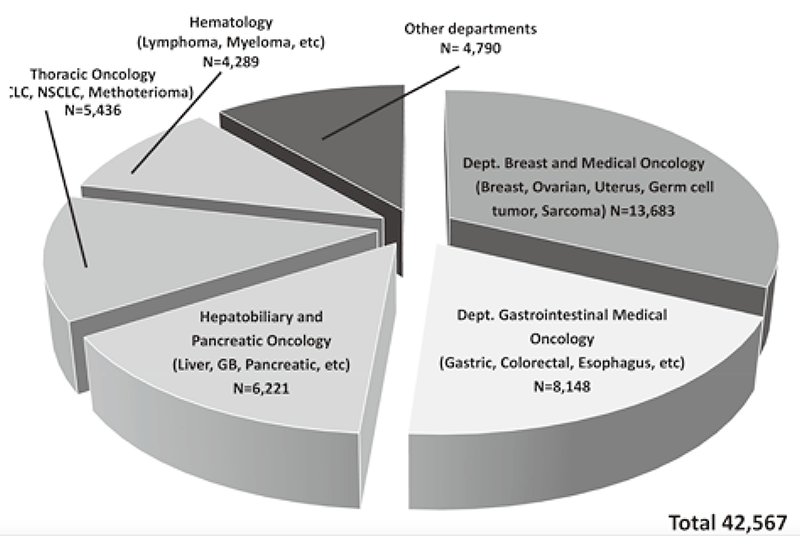Annual Report 2018
Outpatient Treatment Center
Kenji Tamura, Shunsuke Kondo, Kazuki Sudo, Hidehito Horinouchi, Satoru Iwasa, Dai Maruyama, Yasuji Miyakita, Tadashi Kumamoto, Tomohiko Hara, Shin Tsutsumida, Masatoshi Sekiguchi, Toru Akagi, Tomomi Sano, Miho Kurihara, Chiemi Kojima, Hiroe Ohara, Mayu Harada, Kimihiko Kawamura, Koichi Ishikawa
Introduction
The Outpatients Treatment Center deals with all kinds of cancer patients who have received chemotherapy as outpatients. Our mission is to provide safe, comfortable and highquality chemotherapy. Several groups collaborate to ensure the best chemotherapy, consisting of medical oncologists, nurses, pharmacists, medical social workers (MSW) and clinical research coordinators (CRCs). Our visions are: 1) to provide evidenced-based medicine (EBM) and develop novel anti-cancer drugs; 2) to provide safe and efficient treatments, and management of adverse events; and 3) to create a comfortable environment, and to maintain the quality of life of the patients.
The Team and What We Do
1) Setup
Our division consists of one director (K.T.), and other nine medical doctors, one deputy nurse director, one nurse manager, two deputy nurse managers, one deputy drug director, one chief pharmacist, one dispensing chief, one chief engineer of Dept. Clinical Laboratory, 24 nurses, three pharmacists, and two to three reception staff.
2) Performance
There are 30 beds in the 1st Outpatients Treatment Center and 26 in the 2nd Outpatients Treatment Center (total 56). We also have 6 beds for general infusions or blood transfusions. In 2018, the Outpatients Treatment Center supported 42,567 patients who received anticancer drugs (Figure 1). The breakdown by department was Breast and Medical Oncology (n=13,683), Gastrointestinal Medical Oncology (n=8,148), Hepatobiliary and Pancreatic Oncology (n=6,221), Thoracic Oncology (n=5,436), Hematology (n=4,289) and other department (n=4,790) (Figure 2). General infusions, general intramuscular or subcutaneous injections, blood transfusions, bone marrow punctures, lumbar punctures, intraperitoneal or chest drainage and blood gas analyses were conducted in the center.
Figure 1. Total number of patients who received chemotherapy in the Outpatients Treatment Center



3) Staff Meeting
The monthly staff meeting is held every second Tuesday, 16:30-17:30, every month with the participation of physicians and nurses who are the main members in the center. The steering committee is held every third Tuesday every month.
4) Hot line & Conference
We have a telephone consultation (Hot line) for outpatients who have received chemotherapy. We have around 120 Hot line cases per month. A case conference especially about the Hot line is held monthly on a Tuesday with the participation of multidisciplinary specialists, including medical oncologists, nurses, and pharmacists.
Research activities
- Operation of early morning frame
- Support for working in investigational drugs including PK studies.
- Safety management of allergic reactions and infusion reactions
- Telephone hot line for emergencies for outpatients who receive chemotherapy.
- Monitoring adverse events of immuno check point inhibitors.
- Communication with other departments
Education
We provide educational opportunities for multidisciplinary specialists, including medical oncologists, nurses, and pharmacists. We also provide an educational program for institutions outside the NCC, for medical oncologists, nurses, pharmacists and MSW in designed hospitals for cancer treatment in each prefecture.
Future prospects
We are going to run more early morning frames in the Treatment Center and continue proposing a model for more clinical trials in an outpatient style. We aim at shortening waiting times, smooth administration of novel molecular targeted drugs for outpatients, to put into practice multidisciplinary care, and create a comfortable environment for cancer patients who received chemotherapy in the Outpatients Treatment Center.
